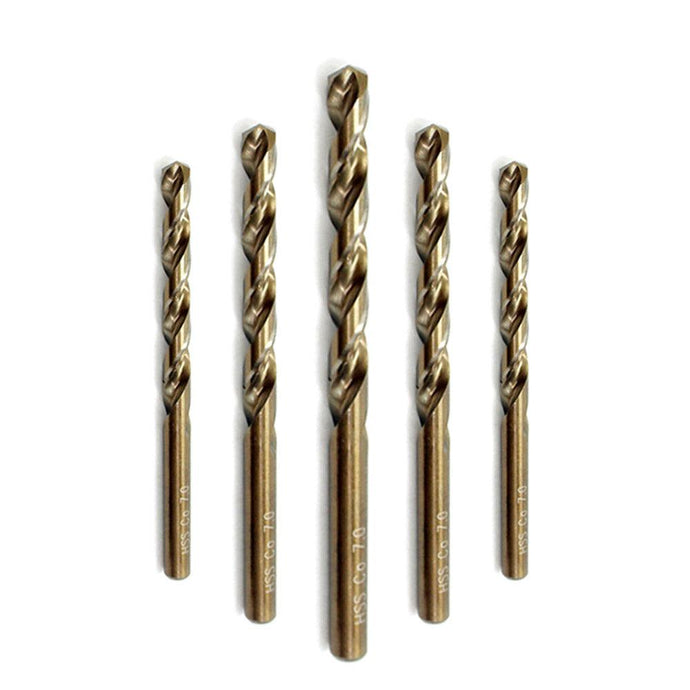When it comes to drilling, selecting the right bit can make all the difference in performance, precision, and longevity. Among the vast array of drill bits available, durability is a crucial factor, especially for professionals and hobbyists working on demanding projects. The wear and tear on drill bits, particularly when drilling through tough materials, can lead to frequent replacements if the right tool isn't chosen. So, what type of drill bit is the most durable? The answer largely depends on the material of the drill bit itself and its intended use, but there are a few clear leaders when it comes to long-lasting performance.
One of the top contenders for the most durable drill bit is the carbide-tipped bit. Carbide, a compound made of carbon and metal, is known for its exceptional hardness and heat resistance. These characteristics make carbide-tipped bits particularly suited for drilling through hard, abrasive materials like steel, stainless steel, cast iron, ceramics, and concrete. Unlike high-speed steel (HSS) or cobalt bits, which can wear down or overheat when used on tough materials, carbide-tipped bits maintain their cutting edge longer and resist the heat generated during drilling. The ability to withstand high temperatures without losing hardness means that carbide-tipped bits can operate at higher speeds and endure prolonged use without dulling as quickly, making them one of the most durable options on the market.
Solid carbide drill bits take the durability of carbide-tipped bits a step further. Instead of just having a carbide tip, the entire bit is made from carbide. This makes solid carbide bits exceptionally hard and resistant to wear, especially when drilling through extremely tough materials like hardened steel or masonry. While solid carbide bits offer the highest durability, they are also more brittle than other types of bits, which can lead to chipping or breakage if not used carefully. However, in the right conditions and with the proper technique, solid carbide bits provide unmatched longevity, making them ideal for industrial applications where precision and endurance are critical.
Cobalt drill bits are another excellent choice when durability is a top priority. Cobalt is not an actual coating but rather a blend of high-speed steel with a percentage of cobalt alloy (typically between 5% and 8%). This blend enhances the bit's hardness and heat resistance, allowing cobalt bits to cut through tough metals like stainless steel, titanium, and high-carbon steel. Cobalt bits have the added advantage of being more resistant to wear than standard HSS bits, which tend to dull faster when subjected to high-friction drilling. Unlike coated bits, cobalt drill bits can be sharpened without losing their heat-resistant properties, ensuring they remain useful over an extended period. For machinists and fabricators who frequently work with metal, cobalt bits strike a balance between durability, cost, and performance.
Black oxide-coated drill bits offer a more durable alternative to standard HSS bits. The black oxide coating adds a layer of corrosion resistance and helps to reduce friction during drilling. This coating not only extends the life of the bit but also allows for smoother, more efficient drilling in a variety of materials, including wood, metal, and plastic. While not as durable as carbide or cobalt bits, black oxide-coated bits are an economical option for users who need a bit more durability than basic HSS bits provide. They are particularly suited for general-purpose drilling where extreme hardness isn't necessary, but a longer tool life is still desired.
Titanium-coated drill bits are another popular option for those seeking durability. These bits feature a coating of titanium nitride, which significantly increases the bit's hardness and reduces friction, allowing for cooler operation and less wear. Titanium-coated bits are particularly effective for drilling through metal, including aluminum and copper, and they offer much better wear resistance than uncoated HSS bits. However, it's important to note that titanium-coated bits cannot be sharpened without removing the coating, which means their durability is limited to the lifespan of the coating itself. Once the coating wears off, the underlying HSS is exposed, and the bit's performance will decline. Despite this limitation, titanium-coated bits are a solid choice for users who need enhanced durability for metalworking or frequent drilling tasks.
For woodworkers, brad point bits made of high-quality steel or carbide-tipped brad point bits offer excellent durability. These bits are designed specifically for drilling into wood, providing clean, precise holes without tearing the wood fibers. The brad point design centers the bit and prevents wandering, which reduces the strain on the cutting edges. While not as durable as carbide or cobalt bits in terms of hardness, a well-maintained brad point bit can last a long time when used properly on wood and softer materials.
Ultimately, the most durable drill bit depends on the material you are drilling and the specific demands of your project. For the toughest materials and longest lifespan, carbide-tipped and solid carbide bits are unparalleled in their hardness and heat resistance. Cobalt bits offer excellent durability for metalworking, while black oxide and titanium-coated bits provide enhanced wear resistance for more general applications. By selecting the right bit for the job, you can extend tool life, reduce downtime, and achieve better drilling results, making durability a key factor in choosing the ideal drill bit.

